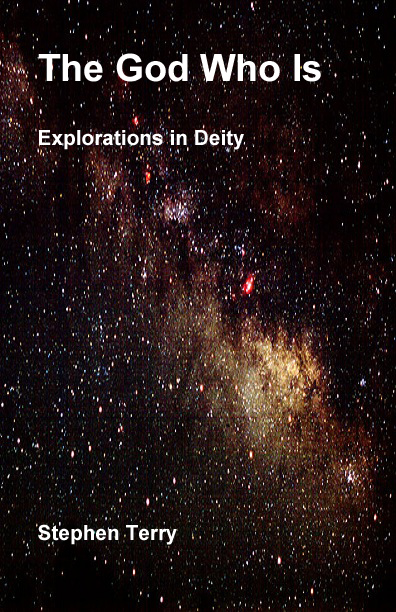
Stephen
Terry, Director

The Bible--the Authoritative Source of
Our Theology
Commentary
for the April 25, 2020 Sabbath School Lesson
 "And
the Word was made flesh, and dwelt among us, (and we beheld his glory, the
glory as of the only begotten of the Father,) full of grace and truth."
John 1:14, KJV
"And
the Word was made flesh, and dwelt among us, (and we beheld his glory, the
glory as of the only begotten of the Father,) full of grace and truth."
John 1:14, KJV
For as long as I can remember, the Bible has held a
special attraction for me. I will admit that the archaic language of the King
James Version may have played a role in piquing my curiosity. The strange
language and the claims of almost magical happenings were compelling. I had
begun reading science fiction in the third grade and this seemed to fit right
in. Just like the science fiction, the Bible had villains who plotted evil
conspiracies and heroes who were guided by higher moral principles. Admittedly
this was science fiction largely written between the victory of World War II
and the social moral collapse that accompanied the Vietnam War. I suspect
modern science fiction with all of its psychological angst would not have had
the same effect as "Lucky Star and the Moons of Jupiter" by Isaac
Asimov, and the rest of the Lucky Starr series. I am tempted to look back at
those times as simpler, without the complications of modern life. In reality
though, I think I probably had a simpler outlook on life.
The problems of life are often mercifully kept at a distance
from the lives of children. They will have to deal with adult life soon enough.
But for the adults living during those postwar years, life was becoming
complicated and frightening. The Korean War exploded into the news headlines
with an intensity that was not rivaled until the Vietnam War. Russia developed
nuclear weapons and the Cold War began with everyone living under the threat of
nuclear annihilation as portrayed in the 1964 movie "Failsafe."
Perhaps the thought that life was so tenuous drove the "anything
goes" attitudes of the 1960s and 70s. Escapist literature was perhaps also
a response to the angst. Science fiction served that purpose as well, and maybe
the Bible did also, for it promised a different outcome for God's people than
the dystopian future that appeared to be rapidly gaining ground in the world
around us. At a time when many felt helpless before these globe encompassing
threats, the Bible offered the idea that there was an alternative with a God
who intervened two thousand years ago, and who promised to intervene again when
things got bad enough. This was like a safety valve on the pressure cooker the
world seemed to be. All we needed to do was to live as Jesus had modeled and
taught back then, and his grace and love would gain us entre to something
better, perhaps in this life and certainly in the next. Some who may have had
more than their share of knocks in life may feel that this is foolishness. But
one of the joys of childhood is the right to entertain foolishness in order to
see where it leads.
I became familiar with what is in the Bible long before
I began to understand what the Bible is. It is an anthology, a collection of
works by different authors compiled for publication. Usually in such works,
there is a central organizational theme chosen by the compiler or editor.
Science Fiction as well as other genres has produced anthologies such as
"The Year's Best Science Fiction," for as long as I have been
reading. The Bible also has a theme as it is a compilation of experiences by
various individuals and peoples and their struggles to define themselves and what
that means in terms of having a relationship to a creative, interventionist
deity with incomparable powers of being, action, and perception. While some may
wish to see the Bible as having sprung complete from
the mouth of God and therefore literally perfect and beyond question, the reality
is far different.
The Bible appears to have its roots in oral traditions
long shared by primitive peoples, perhaps as a means to find rationality and
meaning in the chaotic events that challenged their lives. In a time before knowledge
of disease and genetic disorders, such things could be explained as God
ordained and beyond our understanding. Therefore as mere mortals, we must
humbly accept that somehow it was all according to plan. This may even have eventually
evolved into an attempt to avoid personal responsibility for bad things
happening, giving rise to the problem of theodicy. After all, if suffering is attributable
to God, why is he this way? This becomes especially challenging to faith when
confronted with the obvious loving compassion of Jesus and the many Bible
verses that speak of a loving God. In all fairness though, in asking God why he
allows such heartbreaking evil in the world, he might just as rightfully ask
the same question of us. We ask why his justice does not immediately punish the
wicked and rebuke the evil. But we also have done the same at times when evil
goes free in the interest of protecting the civil rights of all. But I digress.
While the Bible stimulates us to ask such questions it is the source of the
Bible that is our focus.
As the oral traditions began to be written down, discrepancies
were discovered and in some cases were made to harmonize with one another and
in others, not dealt with at all. A good example of the former is the number of
animals to be taken by Noah into the Ark. One account in Genesis, chapter six
has God saying take two of every kind of animal, while in a later account in
chapter seven, God says two of every kind of animal, except the clean animals.
Those are to be taken into the Ark with seven pairs of each kind. Obviously,
since the sacrificial system had been in place since Abel, offering sacrifices
would have exterminated species that only had one pair saved from the flood. Never
mind that it is biologically challenging in any case to prevent the extinction of
a species with only one breeding pair; the account is about religion, not
science. But the altered account reveals that even religion must bow to logic
at some point. There are many apparent attempts to harmonize the text as well
as outright contradictions in the Bible, but these, far from being slights on
the Bible, are proofs of its anthological authenticity. In spite of the
attempts to gloss over the apparent conflicts, these are records of real people
seeking a path forward in their understanding of God, even if their experiences
are not always in harmony with one another.
Through the centuries, many committees and councils have
sought to "purify" the Bible by establishing an allowable canon and
ruling out many other works. These bodies do not always agree. For instance
when an attempt was made to create a Greek volume of Hebrew texts in the third century
BCE, a group of scholars created the Septuagint, a volume that included several
texts that the later Hebrew Old Testament as recognized by the Council of Jamnia in the 2nd century CE did not. The
Septuagint was the commonly referred to scripture of Christ's day. The
documents that eventually became the New Testament also being written in Greek,
illustrate how dominant the Greek language had become in Palestine, probably
due to the influence of the empire created by Alexander the Great and overseen
by his generals and their descendants.
Since today, most translations go directly to the Hebrew
text for the Old Testament, they tend to follow the later Hebrew canon and
leave out the books and chapters that the Septuagint included. Our New Testament
canon was not relatively finalized until the 4th century, and was
likely driven to a degree by the Emperors in order to standardize worship. The
period prior to the Council of Nicaea was rife with alternative texts that were
quoted in the patristic literature of the time. Some were based on divergent
theologies and others were outright forgeries purporting to be works written by
the Apostles. With the power of the state behind it, the church began in
earnest to consolidate power and purge the world of documents that encouraged
alternatives. As a result we know of some of those documents only by name as no
extant copies survived. Others have survived because they were hidden away or because
vying political entities granted refuge to some worship communities and placed
the documents geographically out of reach of those seeking to destroy them.
All of this makes the Bible as we have it today appear
to be nothing more than a creation of men to justify the control and
exploitation of others in the name of religion, and in many instances that is
exactly how it has been used. But as a child, none of that had any meaning for
me. I was just a young boy with a book that fascinated me and drew me in. There
was something about this book that gave me hope in troubled times and challenged
me to be better than I was. It taught me that what seems impossible is possible
with God. I have had the reality of that kind of experience myself several
times over the course of my life. Of course, some may simply state that those experiences
were merely coincidental, even though unexplainable. But for others that is the
point where religion intersects with mundane reality most profoundly, and it is
exactly that revelatory claim that makes the Bible something beyond a manmade
anthology. That it can still do that in spite of every effort made to mold it
to other purposes is perhaps little short of miraculous.
